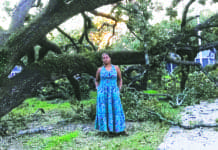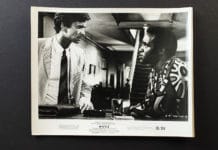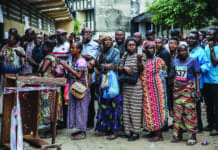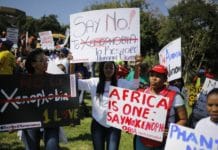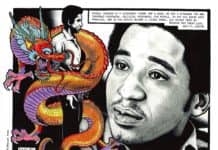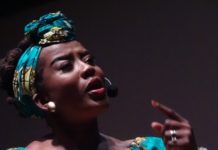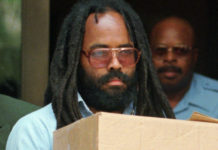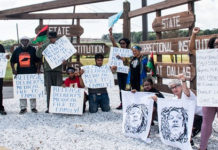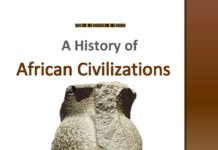by Jean Damu

Set beside widespread beliefs that the West – i.e., Europe and the U.S. – is doing much the same in Libya, the Cote d’Ivoire situation needs to be looked at anew, especially in light of late reports that indicate fighting has broken out among the very forces of Alissane Ouattara that overthrew and arrested the constitutionally certified president, Laurent Gbagbo.
Fascinatingly in the U.S. among the very few that have raised a note of protest to the alleged coup are Evangelical Christians, led by Pat Robertson and his Christian Broadcasting Network. In Africa a growing list of countries including Gambia, South Africa and Angola are protesting the intervention of the West and the overthrow of President Gbagbo.
The mouse that roared
Despite the fact Gambia is the smallest country in continental Africa, on Sunday, April 17, Gambian President Yahya Jammeh issued a vigorous anti-colonial, anti-imperialist call in defense of the deposed Gbagbo.
The statement, read on Gambian television and reprinted in Banjul newspapers, said in part:

“Africans should not only wake up, but stand up to the new attempts to re-colonize Africa through so-called elections that are organized just to fool the people, since the true verdict of the people would not be respected if it does not go in favor of the Western backed candidates, as has happened in Cote d’Ivoire and elsewhere in Africa….
“Our position is very clear. The case of Laurent Gbagbo is a replica of the case of Patrice Lumumba who, as a freedom fighter for the dignity and independence of not only Congolese people but the entire Black race, was overthrown by Western powers, including the U.N., and handed over to his enemies to be murdered.
“History is repeating itself as the same neocolonial forces that overthrew Patrice Lumumba, captured him and handed him over to his enemies almost 50 years ago are the same forces involved in the Ivory Coast with the only difference being that it is now a different former colonial power.”
The statement went on to suggest that an interim government of national unity be formed to immediately organize new elections and that Ouattara be excluded from running based on his illegal taking of power.
In January, South Africa, in a move that temporarily frustrated international efforts to dislodge Gbagbo, parked its naval frigate SAS Drakensberg off the coast of Cote d’Ivoire. The move was widely seen as a statement that South Africa wanted a diplomatic end to the standoff with Gbagbo included in any coalition government.
South Africa’s aggressive posture was counteracted by then acting Nigeria President Goodluck Johnson. Johnson, who also presided over ECOWAS (Economic Community of West African States) provided political cover for French and U.N. intervention by declaring West African support for Ouattara.
The South Africa-Nigeria split on Cote d’Ivoire was complicated by the fact both countries are vying to become permanent members of the U.N.’s Security Council and both are attempting to gain ascendancy over African foreign policy issues.
Tellingly, however, Johnson, who on April 16 was declared the winner of Nigeria’s presidential election, is now being accused of voter fraud on virtually the same scale alleged against Ouattara.
In early April Angola had issued strong words in support of Gbagbo that backed the Gambian position: “(W)e also think that Ivory Coast should create a government of national unity on the basis of dialogue, since Laurent Gbagbo was constitutionally elected.
“War doesn’t work. There needs to be a peaceful solution to the crisis. Angola will not enter Ivory Coast like the French,” Angolan government spokesman Jose-Marie Fernandes said.
Curious and likely unreliable allies
The current crisis in the Cote d’Ivoire – if it can still be defined a crisis – witnessed the takeover of the capital Abidjan by northern rebels led by Allasane Ouattara, the arrest of President Laurent Gbagbo and his family and finally Ouattara being sworn in as president. The crisis stems from Gbagbo’s refusal to accept results from what he considered the highly fraudulent presidential elections of Nov. 28, 2010.
Gbagbo and his supporters say that in the November elections, elections that compare to U.S. primaries, Gbagbo received tens of thousands of votes in the four northern regions – but in the runoff election he was credited with not one single vote.
“This is a statistical impossibility!” wailed U.S. Sen. James Inhofe, D-Okla., to his senatorial colleagues. Inhofe, an evangelical Christian and key spokesman for the creationist movement in Congress, went on to point out to his fellow senators that in one northern region, “We have the precinct tallies of one region alone where Ouattara received 94,873 votes and Gbagbo received none … If you multiply that times four you have the margin that Gbagbo allegedly lost the election by.”
Despite Inhofe’s shaky logic – you would need to examine all four regional vote totals to reach his conclusion – it doesn’t seem possible that any responsible political body would certify an election in which one of just two candidates received no votes in 500 polling stations. But that’s just what the Electoral Commission did. They certified the election claiming Quattara received 54.1 percent of the vote while Gbagbo received just 45.9 percent.
In an anti-climax, however, Constitutional Council President Paul Yao N’dre appeared on state television and declared the results “invalid.” The Constitutional Council is the legal body charged with upholding the Cote d’Ivoire constitution. It is they who swear the president into office.
“CEI (Independent Electoral Commission) was supposed to declare the results by latest on Wednesday (Dec. 1) midnight, but due to disagreements (among themselves – ed.) over results from some regions (four northern regions controlled by Ouattara where Gbagbo received no votes – ed.), it was not able to do so and therefore the Constitutional Council will take up the issue and make a ruling.”

In an interview CBN international affairs correspondent Gary Lane asked evangelical tycoon Pat Robertson an interesting question, “Who swore Ouattara in as president? The U.N.? France? I spoke to all seven members of the Constitutional Council and to a man they laid out all the evidence of why they declared Gbagbo the president and why they think the election was fraudulent. So who swore Ouattara in?”
The answer: Ouattara swore himself in! He did it by sending an email to the Constitutional Council declaring himself president. He did this immediately after the Council had sworn in Gbagbo.
Lane went on to say that he considered “a soft coup d’etat” had taken place in Cote d’Ivoire in an obvious attempt by France at re-colonization.
“Gary, I think you’re right on the money,” Robertson said.
Evidence in support of this theory is that Gbagbo was beginning to make noises and threats regarding nationalization of Cote d’Ivoire’s cocoa industry, an industry that has seen world cocoa prices skyrocket.
But Robertson’s real interest in the Cote d’Ivoire is likely bolstered by his concern, real or imagined, that a new government there would restrict evangelical teachings of the Bible.
However, the malevolent Three Blind Mice (France, the U.N. and European Union) weren’t having it. They declared Ouattara the legitimate president of Cote d’Ivoire and began aiding and fueling his forces and sending in their own forces.
The social base of Ouattara’s movement is mostly comprised of the offspring of large numbers of migrant workers from Guinea, Mali and Burkina Faso (formerly Upper Volta) who were encouraged in the 1960s by first Cote d’Ivoire President Felix Houphouet-Boigny to migrate and work on the coffee and cocoa plantations. They have remained and to this day are considered by many to be foreigners.
Alissane Ouattara, despite – or maybe because of – having been an official at the World Bank, had been instrumental in organizing a series of military coups against Gbagbo. Though the earlier coup attempts failed, the 2002 attempt was successful in virtually splitting the country in half, which explains why the 500 polling stations that claimed Gbagbo received no votes were all in the regions dominated by Ouattara forces.
As reports of murder and detention of Gbagbo supporters increase, likely the Cote d’Ivoire story is far from over.
Jean Damu is the former western regional representative for N’COBRA, National Coalition of Blacks for Reparations in America, and a former member of the International Brotherhood of Sleeping Car Porters, taught Black Studies at the University of New Mexico, has traveled and written extensively in Cuba and Africa and currently serves as a member of the Steering Committee of the Black Alliance for Just Immigration. Email him at jdamu2@yahoo.com.
From AlJazeeraEnglish April 24

 Store
Store



